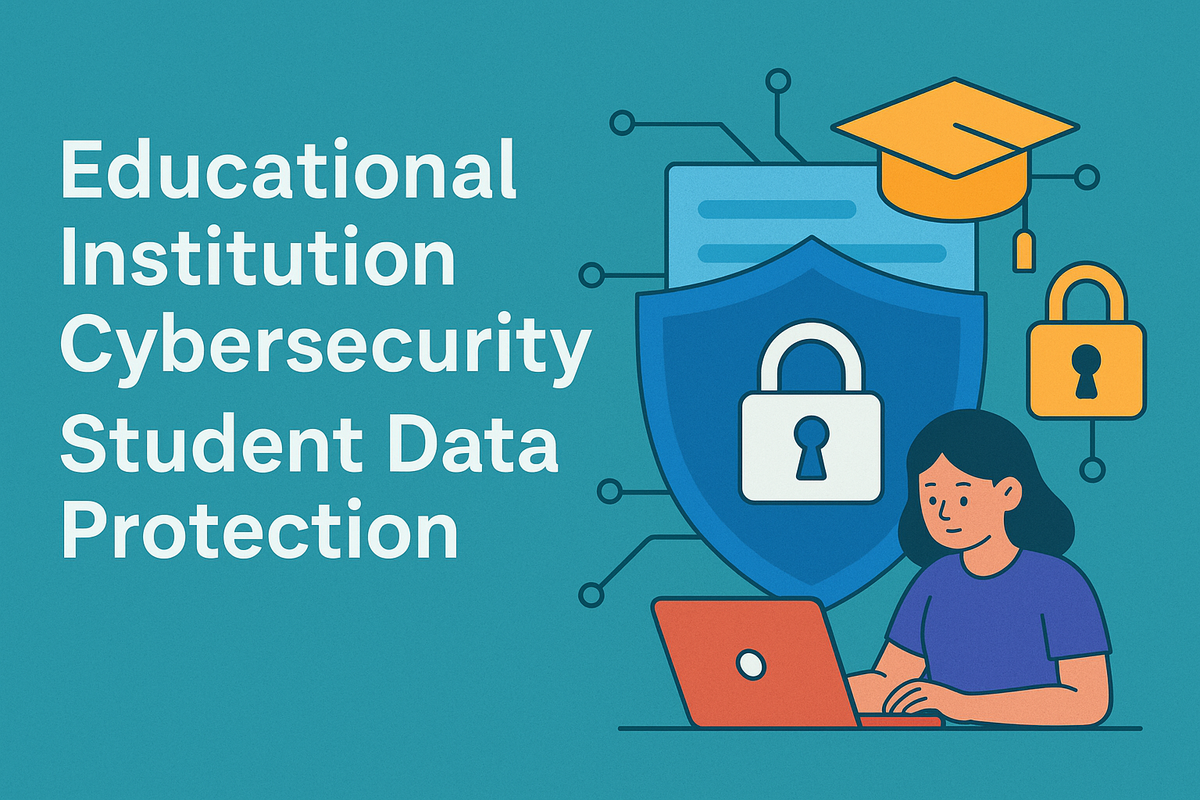Educational Institution Cybersecurity: Student Data Protection

Introduction: Why Student Data Protection Matters
The proliferation of digital platforms in educational settings has made student data protection a strategic imperative. Sensitive information—including academic records, personal identifiers, health data, and behavioral reports—faces growing risks due to cyber threats and regulatory changes. High-profile breaches and tightening global privacy laws, such as the Digital Personal Data Protection Act (India), GDPR (EU), and FERPA (US), underscore the necessity for robust cybersecurity strategies in schools.
Evolving Threats to Student Data
Threat actors target educational institutions for valuable personal data, exploiting phishing, ransomware, and system vulnerabilities. Unique risks include the widespread adoption of EdTech tools and cloud storage, often without thorough security vetting, and insider threats from staff or contractors. Frequent attack vectors:
- Phishing and social engineering directed at staff or students
- Ransomware attacks compromising institutional operations
- Unauthorized access via poorly managed devices or third-party integrations
Legal and Regulatory Requirements
Institutions must comply with a patchwork of global and regional data privacy laws:
- Digital Personal Data Protection Act (DPDPA, India): Requires explicit consent, data minimization, breach notification, and parental consent for minors.
- GDPR (EU): Emphasizes transparency, legal basis, purpose limitation, data minimization, and strong individual rights, enforced via mandatory Data Protection Officers and privacy impact assessments.
- FERPA (US): Protects educational records, requires consent for disclosures, and establishes student rights over their data.
- Local acts (e.g., New York’s Education Law 2-d, Texas/Virginia Student Privacy Acts): Additional procedural and transparency requirements.
Key Principles of Student Data Protection
Effective programs incorporate:
- Data minimization: Collect only necessary student information for educational needs, reducing the attack surface.
- Transparency and consent: Clearly inform students and parents about data use and obtain explicit consent, especially for third-party integrations.
- Rights to access, correction, and deletion: Ensure students or guardians can view, update, or request deletion of their data.
- Accountability: Designate responsible officers and keep thorough records of data processing activities.
Cybersecurity Best Practices for Institutions
- Access controls: Implement strict authentication and role-based permissions to limit data access to authorized users only.
- Encryption: Protect all data at rest and in transit using robust encryption protocols.
- Regular updates and patch management: Ensure systems, software, and apps are up-to-date to reduce vulnerabilities.
- Secure digital tools: Use vetted EdTech and school management platforms with built-in security features (anonymization, secure logins).
- Incident response planning: Develop and rehearse breach response protocols to contain damage and ensure regulatory compliance.
- Security audits: Conduct routine privacy and security reviews to identify gaps and ensure alignment with current laws.
- Data retention and destruction: Align data retention schedules with legal requirements and securely dispose of old or redundant data.
Staff, Student, and Parent Engagement
Building a culture of cybersecurity involves:
- Mandatory privacy training: Educate all staff and students on risks, responsibilities, and safe data handling practices.
- Parental involvement: Communicate data privacy strategies transparently and provide easy channels for parental input and consent.
- Safe online behavior: Promote awareness of password hygiene, responsible social media use, and avoiding oversharing.
Vendor and Third-Party Management
- Assess vendors: Vet and regularly review third-party partners for data protection alignment. Use lists like the Student Data Privacy Consortium for pre-approved solutions.
- Third-party contracts: Ensure contracts specify data ownership, usage limitations, breach notification requirements, and vendor security responsibilities.
Emerging Trends
- Privacy-by-design: Embed data protection controls into the earliest stages of software, process, and platform procurement.
- Automation and proactive security: Deploy solutions that automatically detect and mitigate risks such as behavioral analytics and continuous monitoring.
- AI and biometric usage: Balance innovation with ethical use and compliance, especially as new learning platforms deploy advanced tracking features.
Compliance Frameworks and Resources
Refer to widely-recognized guides and frameworks for building resilient programs:
- Student Data Privacy Consortium
- CoSN National Student Data Privacy Report
- Government privacy portals and regulatory bodies (FERPA, GDPR, DPDPA, local education boards).
Conclusion: Building Cyber-Resilient Education
Ultimately, protecting student data means combining the right technology, legal compliance, proactive culture, and ongoing vigilance. By adopting global best practices, engaging all stakeholders, and continuously updating security and privacy measures, educational institutions can safeguard student information while enabling positive digital learning experiences.
Take the Next Step with CodeSecure Solutions
Cyber threats are growing more sophisticated every day. With a trusted partner by your side, you can safeguard your business while focusing on what truly matters—growth and innovation.
At CodeSecure Solutions, we deliver comprehensive cybersecurity services in Chennai, uniquely tailored for startups, SMEs, and enterprises:
- Vulnerability Assessment & Penetration Testing (VAPT)
- Network Security Solutions
- Compliance Support (ISO 27001, PCI-DSS, HIPAA, DPDP Act, GDPR)
- Cloud & Endpoint Protection
- Security Awareness Training
No matter your industry or size, CodeSecure customizes solutions to fit your needs—ensuring your data, reputation, and operations remain secure.
Ready to Strengthen Your Defenses?
- 📞 Call: +91 73584 63582
- ✉️ Email: vapt@codesecure.in
- 🌐 Visit: www.codesecure.in
Stay secure. Stay informed. Choose CodeSecure Solutions—your partner in cyber resilience.
